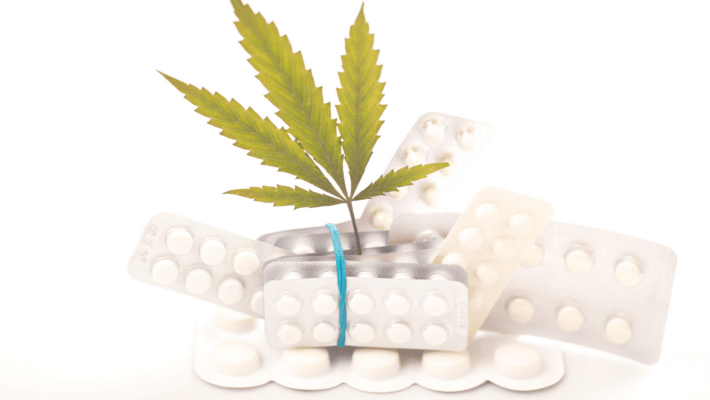
Can Medical Cannabis be Taken With Other Medications?
Published on 10/31/21
As the popularity and legality of cannabis have changed over the past two decades or so, shifting from a black market trade of a drug grown and sold by sketchy, illegal organizations in back alleys and street corners to a legal product sold by friendly budtenders in full legal dispensaries, it's fair to say that the perception of cannabis has changed. Along with the recognition, the general person certainly seems to have come around to the idea of cannabis as medicine.
Science and researchers have shown conclusively that medical cannabis can play a real role in reducing pain, inflammation and a wide variety of other symptoms from often debilitating illnesses. With that role for cannabis as medicine solidified, however, it's important to note that just like other traditional medicines, it may interact with other medications the patient is taking.
Despite this wider knowledge of cannabinoids and their role in helping people medically, many still don't know which medications will interact negatively with any medications they might be taking. That's where Where's Weed comes in. Instead of pulling up your favorite search engine and punching in something like, "can you smoke weed while taking antibiotics" we've got you back.
This article is going to break down some of the most common marijuana drug interactions, give you a comprehensive look at what other drugs you can use with marijuana, and the often misunderstood factors of the interactions betweenmarijuana and prescription drugs. Let's get right into it, shall we?
The Science Behind Cannabis Interactions
 Unsplash
UnsplashSo what exactly is happening in our bodies that makes taking certain medication together so problematic? Just like any other traditional over-the-counter medication, the body processes the compounds in cannabis in the liver. Whether it's eaten, vaporized, rubbed onto the skin topically, or absorbed under the tongue, the end result of breaking down the cannabinoids is the same.
So when you're on a medication for, just as an example, a heart condition, the liver gets to work processing the contents of those meds and getting them into your bloodstream. When cannabis is thrown into the mix, it could inhibit or mess with the normal process of how that other medication is absorbed by the body.
For example, researchers have published a list of 57 different medications that could be impacted by cannabinoid-based products, including CBD oils. To many's surprise, that list included some often prescribed medications like anticoagulants, pain relievers, and birth control pills. On top of that, researchers published a second, longer list of 139 medications that could have cannabinoid interactions but are lower risk.
Lists like these and the work of researchers are vital in making sure that medical cannabis patients on other medications can still get the best out of their various medications.
Most Common Marijuana Interactions

Here are some of the most commonly prescribed drugs that have been shown to be impacted by medical cannabis doses. It's important to note that this is not a complete list, just a breakdown of some of the most likely THC interactions that medical cannabis patients might need to watch out for:
- Drugs that lower blood pressure, like anti-hypertensives: Patients should be advised to watch for signs of hypotension, or low blood pressure. On the other hand, some strains of medical marijuana will increase blood pressure in some individuals. Those two things could work in conflict with one another.
- Drugs that affect blood sugar levels, such as insulin and oral agents like Metformin and Glucophage. Early research shows that insulin resistance is decreased by medical marijuana, which may be problematic for those dealing with blood sugar-related issues.
- Antibiotics: While science shows that smoking weed on antibiotics won't have a drastic effect on the overall effectiveness of the antibiotics themselves, they do reduce the effectiveness a bit. If you're dealing with a particularly nasty infection, it's probably best to avoid too much cannabis.
- Drugs that increase the potential risk of bleeding, such as Coumadin, Warfarin, Heparin, Ibuprofen, Naproxen. Research shows that medical marijuana increases the risk of bleeding with these medications.
- Pain medications like opioids. Often, pain medications can be weaned more efficiently when on medical marijuana. It can decrease pain, as well.
- Alcohol. Medical marijuana can increase the effects of alcohol.
- Sedatives, such as benzodiazepines: Research shows that medical marijuana could increase drowsiness when combined with other drugs. It can also have an additive effect on the medication. Often, sedatives can be weaned very slowly, while incorporating it.
- Some antidepressants such as tricyclic antidepressants and SNRIs, such as amitriptyline, amoxapine, desipramine. Patients may have increased drowsiness.
- Barbiturates, such as phenobarbital.
- Anti-histamines: Medical marijuana can potentiate the drowsy effect of anti-histamines.
Interactions with Your Doctor
Just like any other medication, you should absolutely consult with both your licensed cannabis doctor and your standard practitioner before starting, stopping or altering your dose of any prescribed medication. Those medical professionals know best and working with them, providing honest information, and not rushing into medication changes is the best way to ensure that patients avoid serious marijuana drug interactions.
Have you ever had an adverse reaction between a prescription and medical cannabis? Share with us in the comments below!
